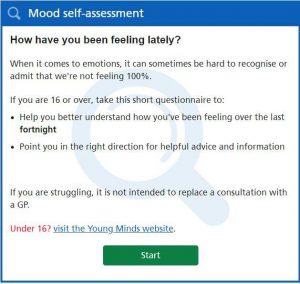NHS self assessment for generalized anxiety disorder and depression
a state of well-being in which every individual realizes his or her own potential, can cope with the normal stresses of life, can work productively and fruitfully, and is able to make a contribution to her or his community.
The Measuring National Well-being programme reports that 17.9% of respondents reported symptoms of mild to moderate illness such as anxiety or depression.
Depression can present us with an array of interesting physical and mental symptoms. Depression affected 3.3% of the population while the most common mental illness, mixed anxiety and depression, affected 7.5% of the population during 2014.
We often brush off depression as just feeling low, but when symptoms persists then we should consider if we are experiencing more than just a low mood.
| Psychological | Physical | Social |
|---|---|---|
| Low mood for more than two weeks | Tiredness | Withdrawing from friends |
| Lacking enjoyment | Lacking energy | Neglecting hobbies and interest |
| Feelings of hopelessness | Eating too much or too little | Difficulties at home |
| Indecisiveness | Sleep disturbance | |
| Tearfulness | Aches and pains | |
| Poor concentration | Constipation | |
| Feeling bad about self | Changes to menstrual cycle | |
| Irritability | Loss of libido | |
| Anxiety | ||
| Thoughts of self harm | ||
| Suicidal thoughts |
References
Mind (n.d) Mental health facts and statistics. Available at: https://www.mind.org.uk/information-support/types-of-mental-health-problems/statistics-and-facts-about-mental-health/how-common-are-mental-health-problems/#two Accessed 8th May 2019
NHS (2016) Clinical depression. Available at https://www.nhs.uk/conditions/clinical-depression/. (Accessed 8th May 2019)
NHS (2018) Low mood and depression. Available at https://www.nhs.uk/conditions/stress-anxiety-depression/low-mood-and-depression/. (Accessed 8th May 2019)
Suicide rates
The rate of suicide for men in agricultural related trades is 1.7 times higher than the national average.
However, this is just the tip of the iceberg as there is likely to be 100 more people with depression in contact with their GP and a further 400 not consulting their GP for each suicide.
Lethal means
The ability of farmers to access lethal means is one contributing factor to the high rates of suicide within agricultural occupations. Firearms and poisons, both of which farmers have access to, have high lethality.
Of the suicides of individuals working in agricultural related occupations, 12.6% involved firearms. This is the highest proportion for any occupation. Across all occupations, only 1.7% of suicides involved firearms.
This could suggest that those with access to lethal means are more frequently successful in their attempts. Therefore, it would be interesting to compare rates of attempted suicides by occupation also.
Mental health
Compared to other occupations, it is likely that farming community experience a higher burden of psychiatric morbidity.
When assessing farmers and their partners and non-farmers, Hounsome et al (2011) found that the farming community had a higher rate of psychiatric disorders. Mental disorders are a risk factor for suicidal behaviour. Of the farmers who died by suicide between 1991 and 1993, 63% were suffering from a mental disorder at the time of their death.
Limitations
The Office of National Statistics reports deaths registered as suicide for individuals aged between 20-64 years. However, the 2016 farm structure survey reported 40% of farm holders and 35% of farm managers were over the age of 65.
References
DEFRA 2016, Agriculture labour in England and the UK. Farm Structure Survey 2016. Available at https://assets.publishing.service.gov.uk/government/uploads/system/uploads/attachment_data/file/771494/FSS2013-labour-statsnotice-17jan19.pdf (Accessed 8th May 2019)
Hounsome, B., Edwards, R.T., Hounsome, N. and Edwards-Jones, G., 2012. Psychological morbidity of farmers and non-farming population: results from a UK survey. Community mental health journal, 48(4), pp.503-510.
Lobley, M. Johnson, G. Reed, M Winter, M. & Little, J. (2004) Rural Stress Review Final Report. Research Report no. 7. University of Exeter. Available at https://www.researchgate.net/publication/29811131_Rural_Stress_Review_Final_Report (Accessed 2nd May 2019)
Office for National Statistics (2017). Suicide by occupation, England: 2011 to 2015. Available at https://www.ons.gov.uk/peoplepopulationandcommunity/birthsdeathsandmarriages/deaths/articles/suicidebyoccupation/england2011to2015#additional-data-included-in-the-accompanying-data-tables (Accessed 29th April 2019)
Thomas, H.V., Lewis, G., Thomas, D.R., Salmon, R.L., Chalmers, R.M., Coleman, T.J., Kench, S.M., Morgan-Capner, P., Meadows, D., Sillis, M. and Softley, P., 2003. Mental health of British farmers. Occupational and Environmental Medicine, 60(3), pp.181-186.
20 minute online suicide prevention training from Zero Suicide Alliance




